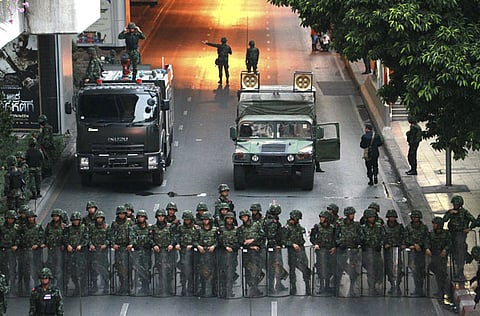Thai coup leader gets royal backing
General Prayuth Chan-ocha warns that his troops will shoot if necessary to put down opposition

Bangkok: Flanked by 14 military officers and wearing an immaculate white uniform replete with enough gold braids to tie a nation up in knots, General Prayuth Chan-ocha appeared on all television stations here on Monday morning to confirm what’s been evident for the past four days.
He is in charge, has the all-important blessing of King Bhumibol Adulyadej, and is calling the shots in Thailand. And he warned that his troops in the streets will use shots if necessary to put down any opposition to military rule here.
“The most important thing right now is to keep peace and order in the country,” said Prayuth. “The less you allow me to speak, the more I’ll be able to work.”
And politicians from the abolished senate and parliament, as well as mostly pro-government activists, are being detained. The media here is also largely silenced. Emails, BlackBerry Messenger and phone services for Gulf News here were also disrupted.
King Adulyadej, 86, is in frail health and lives permanently in his summer palace in Hua Hin, two hours drive to the south of Bangkok. He was last seen in public earlier this month for his official birthday celebrations, but the monarch has, according to Prayuth, given his junta his blessing.
The junta took power on Thursday, two days after imposing martial law and a 10pm to 5am curfew. The coup ended months of political stalemate as opponents of the newly deposed government and former prime minister Yingluck Shinawatra blocked streets. At least 800 were injured in the protests and 28 people were killed.
During his address yesterday, Prayuth warned protesters that he would use violence to stop demonstrations against his generals’ rule. So far, sporadic protests have occurred in the capital, Chiang Mai in the north, and in Pattaya to the south.
Yingluck had been detained at an army base in central Thailand to be given “time to think” about her future, but there are reports that she has been released from the camp and is being held until house arrest by the military.
Prayuth and his generals who make up the National Council for Peace and Order plan to set up a legislative assembly and reform committee to draw up a temporary constitution and appoint a prime minister. Prayuth has torn up the previous constitution, one that he helped write as part the military administration during the previous coup in 2006 that deposed Yingluck’s brother, Thaksin Shinawatra, as prime minister. He is currently living in exile in Dubai.
The general did pledge that elections would take place at some point in the future — but only when Thailand was at peace.
Suthep Thaugsuban, a former deputy prime minister who has led anti-government protests for the past six months, has also been released from military detention. He, however, was transferred over to the prosecutor’s office to face charges of plotting a rebellion.
Across Thailand, activists, journalists and intellectuals have been summoned to surrender to military custody in a bid to stifle growing opposition to the coup.
Already, the junta has given itself powers to intervene in all civilian and legal cases, reinforcing strict lese-majeste laws that protect the monarchy and has issued a stern warning that any use of social media to criticise its rule will be treated as a national security matter.
“For those of you who use social media to provoke, please stop because it’s not good for anyone,” the deputy army spokesman, Winthai Suvaree, said in a televised statement. The editors of daily newspapers across Thailand were also ordered to appear before the military to be instructed on how to cover the junta and its tight rules.
Various human rights groups and countries have expressed their concern over the coup — among them the US, the EU, Japan, France and Germany — and issued warnings against ‘non-essential travel’ to the popular tourist destination. The US has suspended roughly one-third of its aid to the country.
The former education minister Chaturon Chaisang, who is currently in hiding, told Reuters by telephone that the junta was likely to tighten its grip as the days wore on.
“This is very serious indeed, it’s very bad,” Chaturon said. “It seems they’ll detain a lot of people and we don’t know for how long. It’s going to be very oppressive.”
— With inputs from agencies


